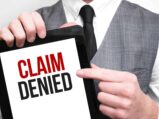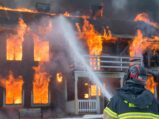An exception to an exclusion in a first-party property policy that applies in a special type of fact pattern where the damage caused by an excluded peril operates as a link in the "chain of events" that enables a covered peril to damage other property. Symbolically, a classic ensuing loss fact pattern can be represented as follows: excluded peril → excluded damage → covered peril → ensuing damage. Note that there must be two kinds of damages—an initial loss and an ensuing loss. Most courts will not apply an ensuing loss provision if an excluded peril caused a covered peril that results in only one kind of damage.
Ensuing loss clauses were developed after the San Francisco earthquake of 1906. Earth movement caused about $80 million in property damage. Gas emitted from pipes broken during the shaking sparked a fire, which spread to the rest of the city and caused another $400 million in other property damage (in 1906 dollars). Symbolically: earth movement (excluded peril) → earthquake damage (excluded loss) → fire (covered peril) → fire damage (ensuing loss). Insurers argued that under the ordinary "proximate cause" rule, the earth movement was the peril that set the "chain of events in motion," and that because earth movement was excluded, the fire damage was excluded, too. After the San Francisco earthquake, the California legislature enacted a set of statutes to prevent insurers from disclaiming coverage for fires ensuing from earthquakes. To comply with these and similar statutes in other states, first-party insurers added exceptions to their earthquake exclusions preserving coverage for ensuing fires. Later, ensuing loss exceptions were incorporated into many other types of exclusions.
Definition provided by the International Risk Management Institute (IRMI) Glossary of Insurance.




